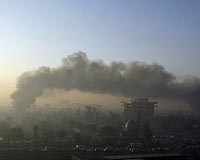| . |  |
. |
Baghdad (AFP) March 17, 2010 Prime Minister Nuri al-Maliki and his main rival Iyad Allawi were projected on Wednesday to win the same number of seats in Iraq's parliament in a dramatic tightening of the country's election race. Maliki's State of Law Alliance and Allawi's Iraqiya bloc were both on pace to garner 87 seats in Iraq's Council of Representatives, with less than 9,000 votes separating the two nationwide, according to an AFP projection based on 79 percent of ballots cast. But votes cast outside Iraq and during special voting for the security forces, the sick and prisoners have not yet been tabulated by Iraq's election commission, and could yet dramatically affect the outcome. The election, the second since Saddam Hussein was ousted in the US-led invasion of 2003, comes less than six months before the United States is set to withdraw all of its combat troops from Iraq. State of Law leads in Baghdad, Iraq's largest province and accounting for more than twice as many parliamentary seats as any other, as well as in the oil-rich southern province of Basra, the third biggest in the country. It is also ahead in five other mostly Shiite southern provinces, but failed to finish in the top three in all but one of Iraq's Sunni-majority provinces. Allawi's Iraqiya coalition, on the other hand, was leading in four provinces, including Iraq's second biggest province Nineveh. It was also neck-and-neck for the lead in a fifth, Kirkuk. He also placed in the top three in six predominantly Shiite provinces where Maliki came either first or second. Overall, Allawi held a slim lead in the nationwide vote count, with 2,102,981 votes cast in Iraqiya's favour, compared to 2,093,997 for the State of Law alliance, a difference of just 8,984 votes. The Iraqi National Alliance, a coalition led by Shiite religious groups is set to come in third with 67 seats, while Kurdistania, comprised of the autonomous Kurdish region's two long-dominant blocs, is projected to have 38. No other group is projected to win more than 10 seats. Fifteen of the 325 seats in parliament are either compensatory or reserved for minorities and were not included in the projection. Iraq's proportional representation electoral system makes it unlikely that any single group will clinch the 163 seats needed to form a government on its own, and protracted coalition building is likely. Both State of Law and Iraqiya have said they have begun talks with rival blocs to form a government, with analysts warning that political groupings could still manoeuvre to form a coalition without either list. Complete election results are expected around March 18, and final results -- after all complaints have been investigated and ruled upon -- are likely by the end of the month. "We need several more days to announce the final results," Qassim al-Abboudi told a news conference on Tuesday, explaining that the appeals process would take about two weeks after full results were published. Opposition groups have alleged fraud in the election and the count, but Maliki dismissed the claims in televised remarks to Iraq's National Security Council broadcast late on Sunday, his first public appearance since his office announced on Thursday that he had undergone surgery for an unspecified ailment. Election officials also downplayed allegations of fraud. National election commission chief Faraj al-Haidari told reporters the number of complaints in the general election was less than half those filed during provincial polls in January 2009. Security officials have expressed concern that a lengthy period of coalition building could give insurgent groups and Al-Qaeda an opportunity to further destabilise Iraq. Their worries were illustrated when a double-blast suicide bomber targeting a military checkpoint and labourers killed eight people and wounded 28 other civilians on Monday, in Fallujah in Anbar province.
Share This Article With Planet Earth
Related Links Iraq: The first technology war of the 21st century
 Iraq PM tightens grip on Baghdad: updated results
Iraq PM tightens grip on Baghdad: updated resultsBaghdad (AFP) March 15, 2010 Iraqi Premier Nuri al-Maliki tightened his grip on key Baghdad province, updated election results showed on Monday, making it increasingly likely his bloc will form parliament's single largest grouping. His success in the capital, which accounts for more than twice as many seats as any other province, builds on his lead in seven provinces overall, and is a major boost for his bid to retain t ... read more |
|
| The content herein, unless otherwise known to be public domain, are Copyright 1995-2010 - SpaceDaily. AFP and UPI Wire Stories are copyright Agence France-Presse and United Press International. ESA Portal Reports are copyright European Space Agency. All NASA sourced material is public domain. Additional copyrights may apply in whole or part to other bona fide parties. Advertising does not imply endorsement,agreement or approval of any opinions, statements or information provided by SpaceDaily on any Web page published or hosted by SpaceDaily. Privacy Statement |